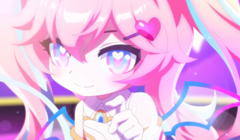In a disturbing case from South Korea, Darim, an animation designer for the popular game MapleStory, faced a barrage of death threats after male gamers mistakenly perceived a character's innocuous hand gesture as a feminist symbol. Late one evening, Darim proudly showcased her studio's latest character design on social media, only to be met with an onslaught of abuse that included threats of violence and demands for her termination. This incident highlights a growing cultural backlash against feminism in the country, where many women express fear of openly identifying as feminists—a reality made worse by the predominant impact of male gamers fueling online witch hunts.
**Backlash Against Feminism in South Korean Gaming Community: A Tale of Harassment and Fear**

**Backlash Against Feminism in South Korean Gaming Community: A Tale of Harassment and Fear**
The online gaming world in South Korea reveals a troubling surge of anti-feminist sentiment resulting in harassment and violence against women.
The fevered response to Darim's animation illustrates a concerning trend in South Korea where young men, feeling threatened by feminist movements, aggressively target women in the gaming industry and beyond. These witch hunts often involve extensive online harassment campaigns aimed to vilify women suspected of harboring feminist sentiments. Minsung Kim, a male gamer and advocate for victims of these attacks, expressed how these men look for any sign of feminism, including vague hand gestures, leading to life-altering consequences for many women.
Not only does this wave of misogyny manifest in abusive messages but it also spills into physical violence, demonstrated in the case of Jigu, who was brutally attacked based on her appearance, being labeled a feminist due to her short hair. Following her attack, which left her severely injured, Jigu now embraces her identity as a feminist and seeks to support others affected by similar experiences.
Women in the country grapple with severe gender discrimination and a deeply entrenched cultural hostility towards feminism, validated by the actions of political leaders who have attempted to roll back gender equality initiatives. As the anti-feminist movement gains momentum, many women feel pressured to conform to traditional roles, staying silent about their beliefs for fear of backlash at work or in their communities.
The societal shift towards misogyny has even penetrated professional environments, with employers increasingly responsive to aggressive demands from anti-feminist groups. Cases where women have lost their jobs or faced severe scrutiny due to perceived feminist behaviors are becoming more common, raising alarms about the future of gender equality in South Korea.
In this volatile landscape, there is an urgent call for legal reform to protect women from workplace discrimination based on their beliefs. Minsung advocates for the need to challenge the loud minority that perpetuates fear and intimidation, claiming that the larger society must stand against such unjust treatment of women to foster a more equitable environment.
As the situation continues to evolve, women in South Korea face critical choices regarding how to navigate their identities amid rampant stigmatization. Activists and advocates urge for resilience, reminding women that they have the power to reclaim their narratives against the backdrop of prejudice and to assert their rights for equality and safety.
With an increased focus on combating misogyny, advocates like Minsung and Jigu are determined to break the cycle of silence, aiming to support fellow victims and restore strength to the feminist movement that has faced unprecedented challenges in recent years.
Not only does this wave of misogyny manifest in abusive messages but it also spills into physical violence, demonstrated in the case of Jigu, who was brutally attacked based on her appearance, being labeled a feminist due to her short hair. Following her attack, which left her severely injured, Jigu now embraces her identity as a feminist and seeks to support others affected by similar experiences.
Women in the country grapple with severe gender discrimination and a deeply entrenched cultural hostility towards feminism, validated by the actions of political leaders who have attempted to roll back gender equality initiatives. As the anti-feminist movement gains momentum, many women feel pressured to conform to traditional roles, staying silent about their beliefs for fear of backlash at work or in their communities.
The societal shift towards misogyny has even penetrated professional environments, with employers increasingly responsive to aggressive demands from anti-feminist groups. Cases where women have lost their jobs or faced severe scrutiny due to perceived feminist behaviors are becoming more common, raising alarms about the future of gender equality in South Korea.
In this volatile landscape, there is an urgent call for legal reform to protect women from workplace discrimination based on their beliefs. Minsung advocates for the need to challenge the loud minority that perpetuates fear and intimidation, claiming that the larger society must stand against such unjust treatment of women to foster a more equitable environment.
As the situation continues to evolve, women in South Korea face critical choices regarding how to navigate their identities amid rampant stigmatization. Activists and advocates urge for resilience, reminding women that they have the power to reclaim their narratives against the backdrop of prejudice and to assert their rights for equality and safety.
With an increased focus on combating misogyny, advocates like Minsung and Jigu are determined to break the cycle of silence, aiming to support fellow victims and restore strength to the feminist movement that has faced unprecedented challenges in recent years.





















